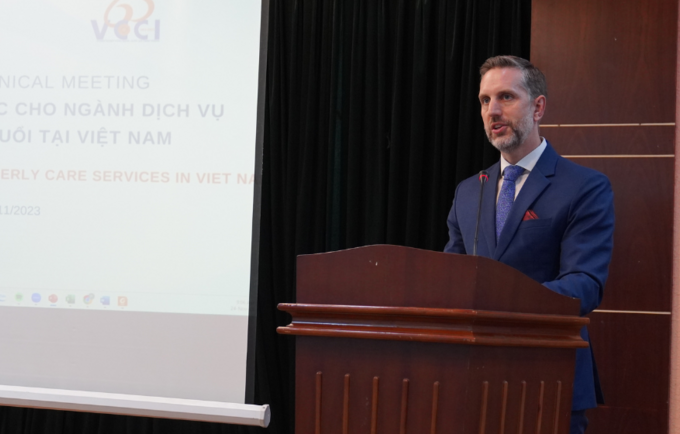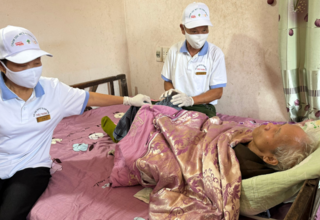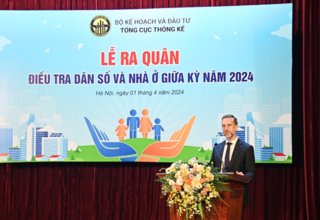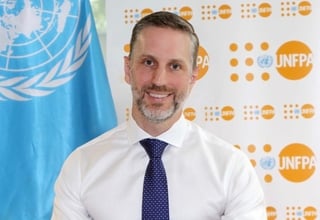- Mr. Võ Tân Thành, Vice Chairman of Viet Nam Chamber of Commerce and Industry – VCCI and Director of VCCI – Ho Chi Minh City Branch;
- Officials from the Government’s Ministries;
- Representatives from the business community; the national and international chambers of commerce;
- And the Viet Nam Association for the Elderly;
- colleagues and partners;
Good morning, everyone.
As the new UNFPA Representative in Viet Nam, this is my first trip to Ho Chi Minh City, an economic hub of the ASEAN region. Your reputation for fast socio-economic development, particularly with the private sector as a driving force, is catalytic for our interests today in the private sector’s involvement in the development of elderly care services.
I thank the Viet Nam Chamber of Commerce and Industry - Ho Chi Minh city Branch (VCCI-HCM) for hosting this event. UNFPA Viet Nam is honoured to be part of the discussion between businesses and policymakers to create an enabling environment for the private sector to contribute to meeting the needs of Viet Nam’s growing older population.
I also wish to appreciate representatives from the Party, Government Ministries and Agencies, international organisations, and stakeholders for your unwaveing support and trust in both UNFPA and VCCI, and for your participation in this meaningful discussion.
Viet Nam is one of the most rapidly ageing countries in the region and worldwide. It is projected that the country's transition from “population ageing” to “aged population” by 2036 will be much shorter than for other countries. The increase in both absolute numbers and the percentage of those over 65 highlights the demand for social care, health care, and financial resource.
Viet Nam must take an action now to prepare for an older society, where people live longer and healthier lives in their families and communities.
A Report on Market Outlook for Elderly Care Service in Viet Nam, conducted by UNFPA and VCCI in 2021 showed that demand for more diversified care for older people in Viet Nam is increasing. As Mr. Vo Tan Thanh said, and it’s worth repeating, the Report also estimates that the domestic service market for older people could reach 20 million potential customers by 2035.
As I travel to Provinces across Viet Nam, I’ve heard that it is traditional for family members to take care of elderly relatives at home. What I also hear, and this resonates with every other country I have visited, is that caregivers are mainly women in the family who may lack training or specific care skills, and, very likely, are unpaid for this care work.
As we live longer, the number of those who need care also increases. Yet we must remember that the older population is not a homogenous group. Each person will have their own individual care needs and preferences. Therefore, provision of care must include a package of care options, institutional and non-institutional, to reduce the burden on family members - especially women.
I have just returned from the 7th APPC in Bangkok where many Member States in the region voiced support for actively engaging with older people and preparing for older age.
Distinguished guests,
UNFPA in Viet Nam recommends a comprehensive elderly care ecosystem that includes home care services, community services, retirement communities, nursing homes, and hospital care. We believe that qualified caregivers are essential for a sustainable system. The involvement of the private sector through public-private partnerships offers an excellent solution.
A business forum in late 2021, organised by VCCI and UNFPA, promoted the private sector's role in developing elderly care services. This led to establishing the Network for the Development of Business Services for Older Persons, with financial support from the Government of Japan, to connect business stakeholders, explore cooperation and seek opportunities in promoting business services for Viet Nam’s growing elderly population. This Network also supports development of qualifications and skills for people working in the senior care service industry.
Your views and recommendations today are invaluable for our next steps together to ensure that older people remain a priority in Viet Nam’s journey to become a healthy society for all where no one is left behind. I look forward to our fruitful discussion.
Thank you. Xin Cam on.




